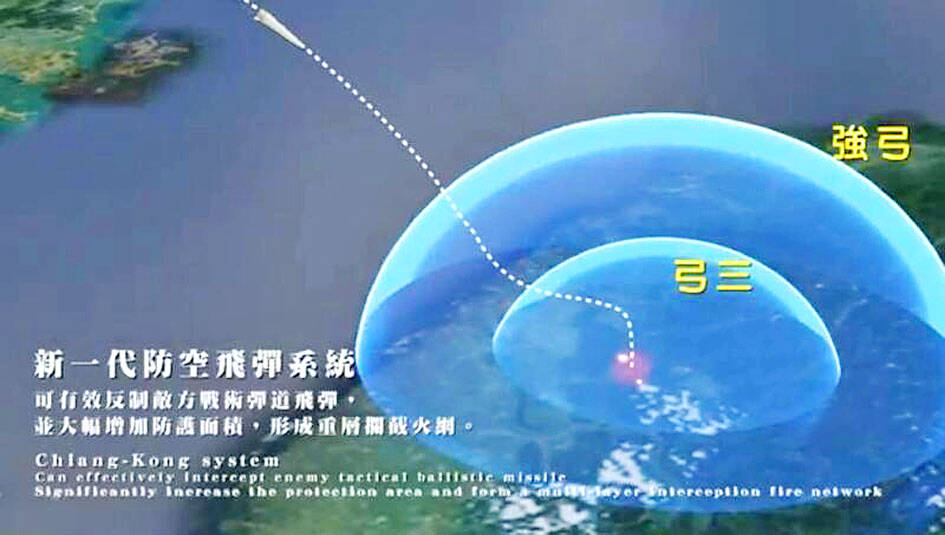The US Department of State on Sunday supported Taiwan’s commitment to raising its defense spending, emphasizing that the US’ top priority is to safeguard stability in the Taiwan Strait and ensure Taiwan has sufficient self-defense capabilities.
In his Double Ten National Day address on Friday last week, President William Lai (賴清德) said that Taiwan would use its new defense budget to accelerate the development of the “T-Dome,” a multilayered air defense system designed to counter growing military pressure from China.
Lai added that defense spending would reach 5 percent of GDP by 2030 to demonstrate Taiwan’s commitment to self-defense.

Photo: screen shot from Chungshan Institute of Science and Technology video
The US Department of State responded by saying it strongly supports Taiwan’s efforts to strengthen its defense and deterrence through reforms and raising military spending.
The department said it welcomes Lai’s announcement that Taiwan plans to increase defense spending to more than 3 percent of GDP this year and 5 percent by 2030.
The US’ top priority is to safeguard peace and stability in the Taiwan Strait, and it would continue to uphold the Taiwan Relations Act to ensure Taiwan has sufficient self-defense capabilities to deal with the threats it faces, it said.
In Taipei yesterday, Minister of National Defense Wellington Koo (顧立雄) said the “T-Dome” air defense system would establish a more efficient and integrated “sensor-to-shooter” mechanism for a higher kill rate, with a year-end special budget to propose specific spending on the system.
“If you do achieve integration, the probability of successful interception naturally increases, and you can conduct firepower coordination with greater efficiency and better resource allocation,” Koo said.
“Sensor-to-shooter” is something the US military has been focusing on, including with the Combined Joint All-Domain Command and Control concept to connect sensors and shooters into one single system.
Taiwan’s existing surface-to-air defense systems are centered around the US-built Patriot and Taiwan-made Sky Bow missiles, as well as Stinger missiles for low-level intercepts. Taiwan is also developing the Chiang-Kong missile for high-altitude interception.
“If we don’t integrate anti-missile, anti-air and anti-drone capabilities, we won’t be able to achieve efficient interception. We will prioritize procurement that emphasizes mobility and high survivability,” Koo said.
A special budget to come by the end of the year would focus on new equipment for the “T-Dome,” he said.
“T-Dome” also fits into Taiwan’s asymmetric approach to warfare to make its forces, which are much smaller than China’s, agile and able to pack a greater and more targeted punch, Koo said.

A Ministry of Foreign Affairs official yesterday said that a delegation that visited China for an APEC meeting did not receive any kind of treatment that downgraded Taiwan’s sovereignty. Department of International Organizations Director-General Jonathan Sun (孫儉元) said that he and a group of ministry officials visited Shenzhen, China, to attend the APEC Informal Senior Officials’ Meeting last month. The trip went “smoothly and safely” for all Taiwanese delegates, as the Chinese side arranged the trip in accordance with long-standing practices, Sun said at the ministry’s weekly briefing. The Taiwanese group did not encounter any political suppression, he said. Sun made the remarks when

The Taiwanese passport ranked 33rd in a global listing of passports by convenience this month, rising three places from last month’s ranking, but matching its position in January last year. The Henley Passport Index, an international ranking of passports by the number of designations its holder can travel to without a visa, showed that the Taiwan passport enables holders to travel to 139 countries and territories without a visa. Singapore’s passport was ranked the most powerful with visa-free access to 192 destinations out of 227, according to the index published on Tuesday by UK-based migration investment consultancy firm Henley and Partners. Japan’s and

BROAD AGREEMENT: The two are nearing a trade deal to reduce Taiwan’s tariff to 15% and a commitment for TSMC to build five more fabs, a ‘New York Times’ report said Taiwan and the US have reached a broad consensus on a trade deal, the Executive Yuan’s Office of Trade Negotiations said yesterday, after a report said that Washington is set to reduce Taiwan’s tariff rate to 15 percent. The New York Times on Monday reported that the two nations are nearing a trade deal to reduce Taiwan’s tariff rate to 15 percent and commit Taiwan Semiconductor Manufacturing Co (TSMC, 台積電) to building at least five more facilities in the US. “The agreement, which has been under negotiation for months, is being legally scrubbed and could be announced this month,” the paper said,

NATIONAL SECURITY THREAT: An official said that Guan Guan’s comments had gone beyond the threshold of free speech, as she advocated for the destruction of the ROC China-born media influencer Guan Guan’s (關關) residency permit has been revoked for repeatedly posting pro-China content that threatens national security, the National Immigration Agency said yesterday. Guan Guan has said many controversial things in her videos posted to Douyin (抖音), including “the red flag will soon be painted all over Taiwan” and “Taiwan is an inseparable part of China,” while expressing hope for expedited “reunification.” The agency received multiple reports alleging that Guan Guan had advocated for armed reunification last year. After investigating, the agency last month issued a notice requiring her to appear and account for her actions. Guan Guan appeared as required,